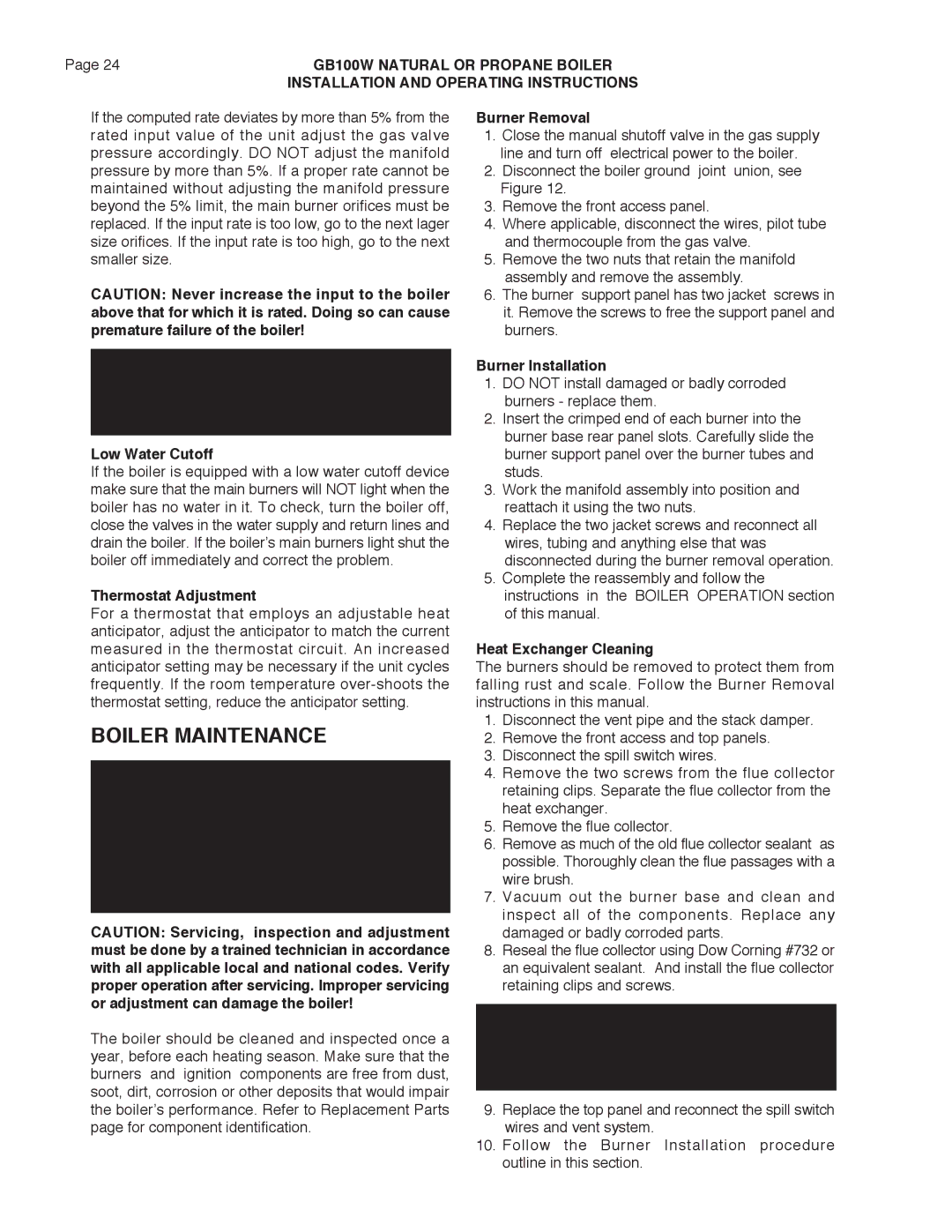
Page 24 | GB100W NATURAL OR PROPANE BOILER |
| INSTALLATION AND OPERATING INSTRUCTIONS |
If the computed rate deviates by more than 5% from the rated input value of the unit adjust the gas valve pressure accordingly. DO NOT adjust the manifold pressure by more than 5%. If a proper rate cannot be maintained without adjusting the manifold pressure beyond the 5% limit, the main burner orifices must be replaced. If the input rate is too low, go to the next lager size orifices. If the input rate is too high, go to the next smaller size.
CAUTION: Never increase the input to the boiler above that for which it is rated. Doing so can cause premature failure of the boiler!
WARNING: Yellow, floating flames indicate a lack of combustion air. Do not operate the boiler until the problem is solved or severe personal injury or death may occur!
Low Water Cutoff
If the boiler is equipped with a low water cutoff device make sure that the main burners will NOT light when the boiler has no water in it. To check, turn the boiler off, close the valves in the water supply and return lines and drain the boiler. If the boiler’s main burners light shut the boiler off immediately and correct the problem.
Thermostat Adjustment
For a thermostat that employs an adjustable heat anticipator, adjust the anticipator to match the current measured in the thermostat circuit. An increased anticipator setting may be necessary if the unit cycles frequently. If the room temperature
BOILER MAINTENANCE
WARNING: The ceramic combustion chamber in the burner box and its gasket contain crystalline silica. Wear a tightly fitted dust mask when servicing the burner and gently handle the burner and its gasket to prevent inhalation of airborne fibers. Crystalline silica fibers have been identified as carcinogenic, or possibly carcinogenic when inhaled.
CAUTION: Servicing, inspection and adjustment must be done by a trained technician in accordance with all applicable local and national codes. Verify proper operation after servicing. Improper servicing or adjustment can damage the boiler!
The boiler should be cleaned and inspected once a year, before each heating season. Make sure that the burners and ignition components are free from dust, soot, dirt, corrosion or other deposits that would impair the boiler’s performance. Refer to Replacement Parts page for component identification.
Burner Removal
1.Close the manual shutoff valve in the gas supply line and turn off electrical power to the boiler.
2.Disconnect the boiler ground joint union, see Figure 12.
3.Remove the front access panel.
4.Where applicable, disconnect the wires, pilot tube and thermocouple from the gas valve.
5.Remove the two nuts that retain the manifold assembly and remove the assembly.
6.The burner support panel has two jacket screws in it. Remove the screws to free the support panel and burners.
Burner Installation
1.DO NOT install damaged or badly corroded burners - replace them.
2.Insert the crimped end of each burner into the burner base rear panel slots. Carefully slide the burner support panel over the burner tubes and studs.
3.Work the manifold assembly into position and reattach it using the two nuts.
4.Replace the two jacket screws and reconnect all wires, tubing and anything else that was disconnected during the burner removal operation.
5.Complete the reassembly and follow the instructions in the BOILER OPERATION section of this manual.
Heat Exchanger Cleaning
The burners should be removed to protect them from falling rust and scale. Follow the Burner Removal instructions in this manual.
1.Disconnect the vent pipe and the stack damper.
2.Remove the front access and top panels.
3.Disconnect the spill switch wires.
4.Remove the two screws from the flue collector retaining clips. Separate the flue collector from the heat exchanger.
5.Remove the flue collector.
6.Remove as much of the old flue collector sealant as possible. Thoroughly clean the flue passages with a wire brush.
7.Vacuum out the burner base and clean and inspect all of the components. Replace any damaged or badly corroded parts.
8.Reseal the flue collector using Dow Corning #732 or an equivalent sealant. And install the flue collector retaining clips and screws.
WARNING: Failure to properly seal the flue collector to the heat exchanger can result in leakage of combustion products which can result in severe personal injury or death!
9.Replace the top panel and reconnect the spill switch wires and vent system.
10.Follow the Burner Installation procedure outline in this section.
